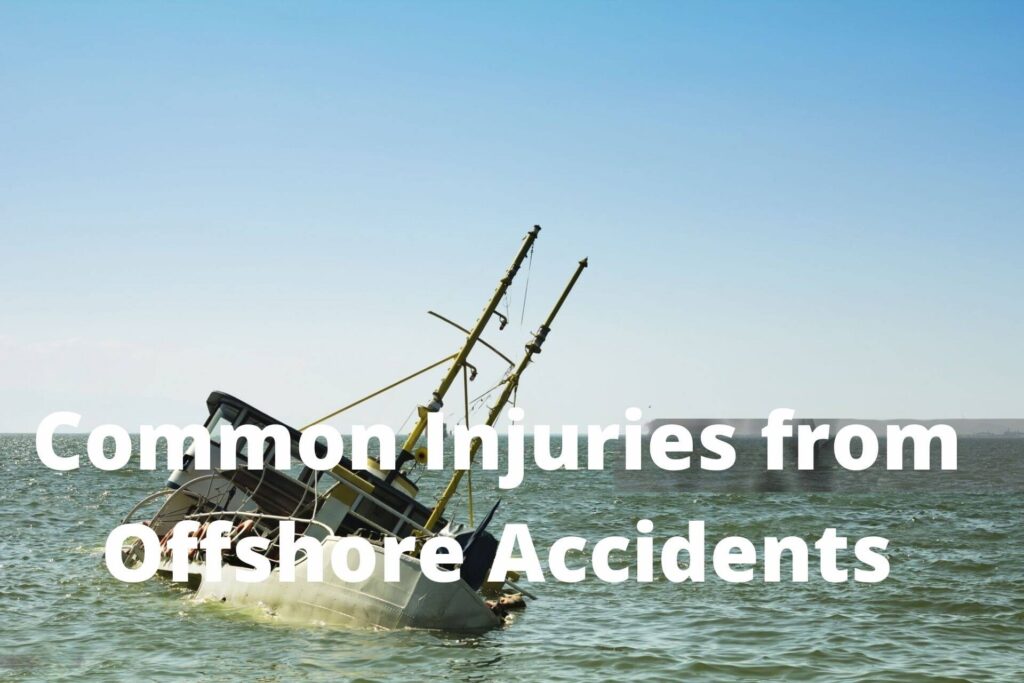Introduction
Offshore mishaps can leave victims with permanent injuries that result in excruciating pain, high medical expenses, and lost wages. You must obtain legal representation from a skilled offshore accident attorney if you or a loved one has been harmed in an offshore accident.
After suffering a severe injury, the legal system may seem overwhelming. However, a knowledgeable offshore accident lawyer can help you through every step of the process and help you make decisions that are best for your family’s welfare as well as your own.
Read Also: Best 18 Wheeler Accident Lawyer | Truck Accident Lawyer
Your advocate, if you get an accidental injury on a variety of marine boats, is an offshore accident lawyer. An offshore accident attorney guarantees a comprehensive investigation to establish liability and identify relevant legislation, regardless of whether the incident occurs on a ship, offshore platform, dock, or in a helicopter transporting crew members to and from land.
Get in touch with Injury & Accident Lawyers, to discuss your offshore injury claim at no cost to you. Since we take cases on a contingency fee basis, we don’t ask for payment up front and only collect attorney fees when a case is successfully recovered.
Helping Families of Offshore Workers:
With decades of experience, the Law Firm represents victims of offshore accidents. Notwithstanding the intricacy of the regulations about severe injuries, our business has the expertise and assets necessary to obtain the compensation you are legally entitled to.
When managing an accident case, our staff puts together a strong team to carefully examine and look into the circumstances underlying your injuries sustained offshore. We understand your predicament, regardless matter whether it pertains to an offshore construction accident, a serious slip and fall, an oil rig drilling catastrophe, or any other offshore occurrence.
Our legal team works hard to build a strong case against everyone you can hold accountable for your injuries.
Examining the Claim for Offshore Injuries:
An offshore accident attorney must conduct a thorough investigation to determine the applicable law. The organizations that manage offshore vessels keep thorough logs and documents, which need to be obtained and examined closely to see if the right processes are being followed.
On-site inspections are essential to telling the incident’s tale in circumstances involving serious injuries. They are excellent at examining sites, retaining the professionals who are needed, and providing a thorough knowledge of the circumstances surrounding an incident.

Typical Offshore Claims Protected by Other Laws and the Jones Act:
Offshore workers are protected from a variety of mishaps by the Jones Act and related laws. How the harm happened becomes less important than the kind of claim that can be made. Frequently reported offshore mishaps consist of:
Slips and Trips:
Soft tissue injuries, bone fractures, and concussions are common outcomes of slips and trips that occur on oil rigs, offshore cranes, platforms, and ships.
Falls from Height:
Serious injuries result from falls that happen on upper decks, downstairs, or in any other elevated situation. To get fair compensation, you should seek the help of a Texas Jones Act attorney.
Falls Overboard:
Claims under the Jones Act and other laws may arise from falls overboard from ships, boats, platforms, rigs, and other offshore employment.
Explosions and Fires:
There is a serious risk to anyone who operates offshore, on oil rigs, or vessels when there are explosions or flames. Victims of such situations who sustain severe burns may be entitled to significant compensation.
Damage Caused by Flying, Swinging, and Falling Objects:
Legal action may be necessary because falling supplies, materials, and moving objects can cause head injuries and other harm. Accidents involving equipment and machinery are frequent on board cargo ships, fishing vessels, and oil rigs. These incidents have the potential to result in injuries.
Exposure to Hazardous Compounds and High Temperatures:
Workers employed offshore are susceptible to hazardous compounds and high temperatures, which raises legitimate concerns regarding their right to remuneration.
Which Law Deals with Offshore Accidents?
The Longshoremen’s and Harbour Workers’ Act, the Jones Act, state personal injury statutes, and federal tort claims are only a few of the numerous state and federal regulations that control offshore accident claims. It would be like trying to navigate these laws without an offshore accident lawyer.

Most Common Injuries from Offshore Accidents:
Even in good weather, maritime personnel might get hurt, especially if there is recklessness involved. Because of their remote location from medical facilities and emergency services, they need Coast Guard helicopters or vessels to respond quickly. Typical wounds consist of:
- falling overboard-related hypothermia
- damage to the spinal cord
- head trauma
- injury to the neck
- injury to the shoulders
- shattered bones
- crushed limbs
- limb loss or amputation
- lacerations and cuts
- Damage
- traumatic brain damage
- Fires
- respiratory disorders
- inhaling smoke or chemical vapors and causing lung damage
The extended healing period required by these injuries puts a heavy burden on injured maritime workers and their families. It is essential to consult with an offshore injury law company to investigate your chances for reimbursement.
State Personal Injury Law and Offshore Injury:
State personal injury law may be applicable in cases when injuries sustained offshore are not covered by particular statutes. Understanding maritime law is necessary to determine the applicable law, which emphasizes the value of speaking with an offshore injury lawyer.
Dissecting Your Texas Offshore Injury Lawyer’s Function:
A Texas offshore injury attorney must have extensive knowledge of maritime laws and processes to defend injured maritime workers. Because they are knowledgeable about frequent offshore mishaps, these attorneys are invaluable resources when looking into mishaps that occur on platforms, rigs, or ships in open waters.
Who’s Responsible for Your Offshore Accident?
- Determining culpability after an offshore injury is complex. Your Texas offshore injury attorney, assesses a range of possible defendants in your case, including:
- A colleague who disregarded safety procedures
- An irresponsible or careless manager
- An employer who neglects to provide adequate worker protection
- A ship captain accountable for a rig or ship mishap
- The manufacturer of a faulty item of machinery or equipment
Which Accident Types Are Handled by Offshore Injury Lawyers?
Lawyers for offshore injuries handle a variety of nautical disasters, including onboard collisions, accidents involving water, and workplace accidents. Their knowledge covers a wide range of topics, including misbehavior by coworkers, safety infractions, poor vessel maintenance, and horseplay.
Is the Cost of an Offshore Injury Lawyer High?
It is not expensive to hire an offshore accident attorney, despite popular belief. Offshore accident lawyers work on a contingency fee basis, meaning they only get paid if they win a case for their clients.
Following an Offshore Accident, What to Do?
After an offshore accident, the following strategic actions must be taken:
1. Quickly Inform Your Employer:
To secure timely reimbursement and prevent questioning, report the accident as soon as possible. Remain true to the truth; do not embellish or mislead.
2. Verify the Account of Your Employer:
Check the accuracy of your employer’s accident report. If there are inconsistencies, provide a formal statement with the necessary corrections.
3. Speak with your Physician:
Once you’re back onshore, consult your physician for an unbiased diagnosis. Your best interests could not be given priority by company doctors.
4. Refuse to Go Back to Work Too Soon:
Fight the urge or pressure to go back to work too soon. You have the right to enough sleep to recover properly.
5. Observe the Advice of Your Physician:
Follow your doctor’s advice at all times, including taking prescribed drugs and showing up for regular follow-up visits.
6. Monitor Your Medical Needs and Costs:
It’s critical to monitor your medical requirements and costs when filing an offshore injury claim. Please call your doctor’s office with any questions, and keep all of your medical bills and paperwork organized in a file.
7. Speak with a Texas Offshore Injury Attorney About Your Possibility of Receiving Compensation Under the Jones Act:
After an offshore accident, you need the assistance of a lawyer with experience with the Jones Act and other maritime injury claims to recover your damages. You pay nothing unless we assist you in obtaining financial compensation, and your initial appointment is free and confidential.



